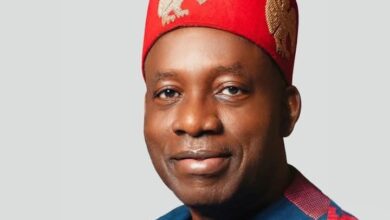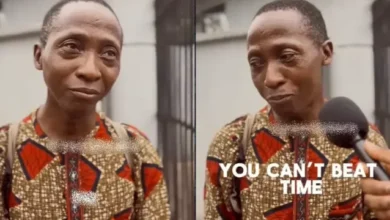Why Simon Ekpa Lost: Inside the Hidden Battlefield of the Courtroom By Basil Odilim

I didn’t realize how closely the world was watching Simon Ekpa’s case. Calls came from the United States, China, and multiple Nigerian newspapers—all asking the same question: why did he lose?
After reflecting on it, one explanation stands out: it was not simply about the law, the facts, or even the defense strategy. It was about the nature of legal representation and the dynamics of high-stakes, politically sensitive cases—where the courtroom is a battlefield, and every move can shift the tide.
In such cases, not all lawyers are what they appear to be. Some may act in ways that favor government interests, intentionally or unintentionally. I describe them as “double agents” or legal hitmen—not as a claim against any specific individual, but as an observed pattern in high-profile litigation.
The author, Basil Odilim Enwegbara
Their victories are sometimes staged or limited to cases the system allows them to win, building reputations that attract clients who may not realize the underlying dynamics.
Once hired, these lawyers appear loyal. They argue passionately. They give every impression of commitment. Behind the scenes, however, cases can be heavily scrutinized, strategies anticipated, and potential advantages neutralized. The result is often a carefully managed outcome—while the client believes they have the strongest representation.
This is not a theory; it is a pattern observed in politically charged legal battles. The stronger your case, the more attention it may receive, and the more carefully it may be challenged by forces beyond your direct control. In this sense, the courtroom resembles a military campaign: every move is monitored, every resource calculated, and every advantage contested.
For anyone navigating such litigation, the lessons are clear. First, study your own case thoroughly. Every fact, precedent, and filing is your territory. Understanding it inside out is essential—you cannot defend what you do not know. Like a general surveying the battlefield, you must know every ridge, river, and road that could affect your campaign.
Second, think like your opponent. Sun Tzu teaches that knowing your enemy is the key to victory. Great commanders—from Alexander the Great to Hannibal—anticipated not only the enemy’s movements but also their reasoning, priorities, and potential errors.
Litigation at this level is no different. Anticipate what your opponents will reveal early to shape the narrative—what they will frontload—and what they will hold back for maximum impact, their potential “Waterloo.”
By imagining the case from their perspective, you can predict arguments, spot traps, and prepare counter-strategies before they are deployed. Victory often comes to those who master foresight, not just reaction.
Third, manage perception—sometimes by creating a false trap for yourself. Deliberately presenting what appears to be a weakness can mislead your opponents into focusing on it, thinking they have found your vulnerability.
While they expend time and energy on this decoy, your true strengths remain hidden and fully preserved. This is not deception for its own sake; it is strategic misdirection—a classic maneuver on any battlefield—giving you a subtle but powerful advantage.
Equally important is choosing the right lawyer. Be cautious of those who are heavily marketed, widely celebrated, or publicly considered unbeatable. Look instead for younger, less-established attorneys who may be less tied to complex networks and more likely to represent your interests sincerely. The right lawyer is a trusted general, not a showman on the parade ground.
Simon Ekpa’s loss is not just about one case; it is a cautionary tale for anyone facing powerful, politically connected forces. Talent, intelligence, and dedication are not enough. In the courtroom, appearances can deceive. Loyalty can be an illusion. Survival depends on vigilance, preparation, and constant oversight.
There is also a broader lesson for Nigerians and observers worldwide: the legal battlefield is influenced as much by networks, alliances, and hidden strategies as by the law itself. A strong case can be undermined if those responsible for defending it are constrained by external pressures.
The legal system can be manipulated—but awareness of these dynamics is empowering. Understanding the risks, taking ownership of your case, anticipating your opponents’ moves like a seasoned general preparing for battle, and managing perception can tilt the balance—even against formidable forces.
In the end, winning a case is not just about evidence or argument. It is about knowing the battlefield, anticipating hidden challenges, and controlling what others perceive. Knowledge, vigilance, and strategic thinking are not optional—they are essential.
Simon Ekpa’s experience serves as a warning and a lesson: appearances deceive, trust can be an illusion, and mastering both the facts and the psychology of litigation is the most powerful safeguard anyone can have.
[Disclaimer: The views expressed here are based on observation and experience and are intended as commentary on systemic patterns in high-profile litigation. They do not accuse any specific individual or organization of wrongdoing.]
Robbed Twice: The Courtroom Where Justice Was Sold

A former governor was dragged to court for looting more than one hundred and fifty billion naira. For once, it looked like justice might finally land on the right doorstep. The people waited, hungry for accountability. For four years, they followed the headlines, whispering in markets and offices that maybe—just maybe—this would be the case that changed everything.
But inside the system, another story was playing out.
The three investigators who built the case were civil servants on meagre salaries, barely four and a half million a year. One struggled to pay his children’s school fees. Another sank under the weight of rent and relatives to feed. The third lived with constant pressure from a partner who knew the risks but also knew what a sudden “gift” could mean for the family’s survival.
The lead prosecutor wasn’t much better. A senior lawyer by title, he earned twelve million a year but had a son studying law in London. His pockets were thin, his pride heavy.
Even the judge—lord of the courtroom—was living on thirteen million a year, with three children in university, a wife battling chronic diabetes, and the silent desperation of a man who had just ten years before retirement and an eye on promotion to the Court of Appeal.
Into this web walked the defence counsel. Not an ordinary lawyer, but a legend of the bar. He came with a five-billion-naira war chest and the promise of twenty billion in fees once the case collapsed. He knew everyone’s weakness. He knew where to press.
The offers were simple. Three hundred and fifty million for the judge, plus quiet help toward his long-awaited promotion. Five hundred million for the prosecutor. Three hundred million for the witnesses, with their rents covered for a decade.
And for the media—three hundred million to kill the story, print only favourable reports, and gather dutifully at a press conference to hail him as a “luminary of justice.”
How do you say no to such money when your children are watching from unpaid classrooms, when your wife’s medicine is running out, when your colleagues know your secrets?
By the time the judgment came, the people had stopped watching. Nigeria had moved on to the next scandal, the next breaking news. The judge, calm and measured, declared that the evidence was “corroded” and that there was no case to answer. The prosecutor, for the cameras, vowed to appeal. It was theatre. Everyone inside the circle knew there would be no appeal.
The governor walked out of court smiling, free to return to high society, already being whispered about for a ministerial position—one he had reportedly secured with a quiet payment of 1.6 billion naira.
The defence counsel basked in the cameras, his brilliance praised, his name cemented. The judge got his elevation. The operatives quietly moved their families into better houses, their children safe in new schools.
And the people? The people were left in silence. Their schools still had leaking roofs. Their clinics still lacked drugs. Their roads were still broken and swallowed by potholes. They were robbed twice: first by the man who stole their money, and then by the very system meant to deliver justice.
What few dare whisper is that the governor belongs to a high circle of an international secret society—one that counts among its membership, the very senior lawyer who defended him and the judge who acquitted him.
Basil Odilim is a public affairs analyst.
The post Why Simon Ekpa Lost: Inside the Hidden Battlefield of the Courtroom <p><span style='color:#808080;font-size:18px;'><i>By Basil Odilim</i></span></p> appeared first on Diaspora Digital Media DDM.





